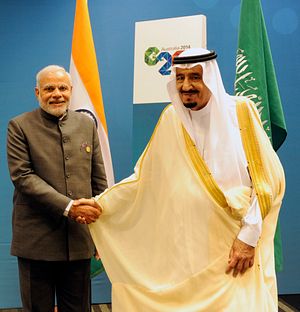Prime Minister Narendra Modi’s government will complete three years in office on May 26, 2017. During that time, improving India’s ties with Middle Eastern countries has been high on Modi’s agenda. In fact, he is visiting Israel in his third year in office, after having visited the Gulf Cooperation Council (GCC) countries UAE, Saudi Arabia, and Qatar. A number of high-level delegations from GCC countries, have also visited India. Significantly, UAE’s Sheikh Mohammed bin Zayed Al Nahyan, crown prince of Abu Dhabi and deputy supreme commander of the Armed Forces, was India’s Republic Day chief guest this year. India has simultaneously strengthened ties with Iran.
In recent years, India’s ties with the GCC have moved beyond a basic buyer-seller relationship. Apart from the economic convergences between India and the GCC, the relationship has progressed thanks to increasing agreement on issues pertaining to terrorism emanating from Pakistan. Former Prime Minister Manmohan Singh’s visit to Riyadh in 2010 laid the foundations for this. In 2012, 26/11 handler Abu Jundal was arrested in Saudi Arabia and deported to India. Increasing U.S. pressure on GCC countries, especially Saudi Arabia, has also helped. During Modi’s visits to GCC countries, all the resulting joint statements have explicitly condemned terrorism in any manifestation – an allusion to Pakistan.
India’s ties with the GCC bloc can no longer be viewed solely through the traditional prisms of energy and issues afflicting the Indian diaspora in the Gulf. Certainly both issues are important in the relationship. More than one-third of India’s crude oil needs are fulfilled by the GCC region. Similarly, a whopping 72 percent of non-resident Indians (NRIs) reside in GCC countries, and India receives remittances to the tune of $40 billion annually from the region.
Yet India and the GCC countries no longer share a mere buyer-seller economic relationship. During Modi’s visit to Saudi Arabia in 2016, both countries agreed to explore opportunities to set up joint ventures in petrochemical complexes and cooperate in joint exploration in India, Saudi Arabia, and third countries. During the visit to India of UAE’s Crown Prince Sheikh Mohamed bin Zayed al-Nahyan in January 2017, both countries signed a deal which allows UAE’s Abu Dhabi National Oil Company (ADNOC) to fill half of an underground crude oil storage facility at Mangalore, part of New Delhi’s strategic reserve system. In return the UAE offered two-thirds of the oil to India for free. Interestingly, the other half of the storage facility has been filled with Iranian crude oil.
Over the years, GCC countries accumulated enormous wealth from the sale of oil. Now the GCC is home to a sovereign wealth fund of more than $2 trillion, which has invested in numerous companies and infrastructure projects around the world. A recent slump in oil prices has forced GCC countries to restructure and diversify their economies, to create non-oil-based revenue sources. As a result, all GCC countries have come up with a vision document for at least the next decade. As per Vision 2030, for example, the UAE plans to generate more than 60 percent of its total revenue from sources other than oil.
At the same time, India needs huge funds to create quality infrastructure and boost its economy, while also generating jobs through initiatives like “Make in India.” India aims to attract investment by projecting India as the world’s number one investment destination. To some extent New Delhi has convinced the GCC countries. During Modi’s visit to Riyadh, then External Affairs Ministry spokesperson Vikas Swarup tweeted, “[Saudi Arabian] Minister Al Falih to PM [Modi]: Aramco looks to India as its No 1 target for investment.”
As per its Vision 2030, Saudi Arabia aims to invest Aramco’s fund in different sectors around the world, making it an international industrial conglomerate. Saudi Aramco is in talks to buy a stake in India’s biggest oil exporter, ONGC Petrochemical Addition Ltd (OPAL), and a planned refinery, which is expected to cost around $30 billion.
Similarly, in August 2015, during Modi’s visit to the UAE, the two countries agreed to establish a UAE-India infrastructure investment fund “with the aim of reaching a target of $75 billion to support investment in India’s plans for rapid expansion of next generation infrastructure, especially in railways, ports, roads, airports, and industrial corridors and parks,” according to the joint statement.
Other Gulf countries like Bahrain have evinced interest in working with India in the start-up sector. Other countries like UAE and Saudi Arabia too could explore newer opportunities and invest in India’s start-ups, particularly as India’s IT sector struggles with layoffs.
India needs to tap all possible opportunities in GCC countries. Besides the central government, state governments too need to reach out more proactively to the GCC. There are likely to be a number of bumps along the way. First, layoffs of Indian workers in GCC countries and ill-treatment by employers will inevitably sour the relationship. Both sides need to find an amicable solution to this problem.
Second, as both U.S. President Donald Trump and Pakistani Prime Minister Nawaz Sharif prepare to attend the Arab Islamic American Summit in Riyadh, New Delhi should not get too distracted. India must understand that while GCC countries may dehyphenate India-Pakistan ties, they will maintain their independent relationship with Islamabad. Similarly, India, while keeping robust ties with GCC countries, has to ensure a good relationship with Tehran.
India’s ties with the GCC have improved by leaps and bounds in the past decade, and with some imaginative thinking will only strengthen.
Tridivesh Singh Maini is a New Delhi-based policy analyst associated with the Jindal School of International Affairs, OP Jindal Global University, Sonipat (India). Sandeep Sachdeva is an independent policy analyst. The views expressed here are personal.

































